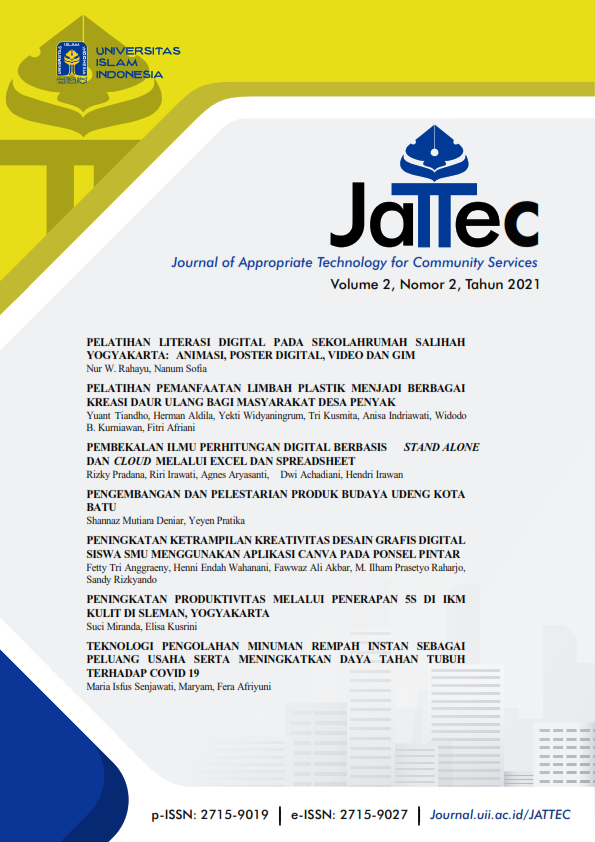Main Article Content
Abstract
Young people could learn and use technology in formal, informal and nonformal education effortlessly. As a legal nonformal education, homeschooling programs become more popular because the programs demonstrate some advantages, such as customized learning materials, personalized learning methods, and flexible learning schedules. However, some homeschooling communities face several problems related to digital literacy skill because of lack of teachers’ capacity and tools. To support digital literacy, a series of training has been conducted for teachers and students at Salihah Homeschool, Yogyakarta. It consisted of training of modern computer technology for teachers and multimedia training for students and parents. The second training taught students on how to make digital posters, videos, animations, and games related to Covid-19 pandemic. Survey showed half of the students were happy with the training activities. Furthermore, the most preferred lessons were animation and digital posters, while game and video tutorials were perceived difficult. Nevertheless, student participation showed a declining trend since the second day of training. Moreover, some parents expressed happiness with the training contents, but there were also parents who found difficulty as the parents were novice users. It implies future efforts to promote positive awareness of the ease of using IT and continuous monitoring to improve digital literacy.
Article Details
References
- Agustina, R., S., Pramesti, U. D., & Rasyid, Y. (2019). Pelatihan Penelusuran Informasi Elektronik dalam Peningkatkan Keterampilan Menulis Karya Ilmiah Siswa SMPN. JP-IPTEKS: Jurnal Pengabdian Kepada Masyarakat, 65–74.
- Ala-Mutka, K. (2011). Mapping Digital Competence: Towards a Conceptual Understanding. ftp://jrc.es/pub/EURdoc/JRC67075_TN.pdf
- Diana, L., Hadining, A. F., & Fitriani, R. (2020). Analisis Faktor yang Mempengaruhi Adopsi Rumah Belajar di Kabupaten Karawang. MTI: Jurnal Penelitian Teknologi Informasi Dan Komunikasi, 11(2), 79. https://doi.org/10.17933/mti.v11i2.180
- Duerager, A., & Livingstone, S. (2012). How can parents support children’s internet safety? In EU Kids Online. http://eprints.lse.ac.uk/42872/1/How can parents support children’s internet safety(lsero).pdf
- Hartanto, A. D., & Nurharjanti, M. (2018). Implementasi teknologi pembelajaran dan kelas digital untuk SMP kota Yogyakarta. Prosiding Seminar Nasional Seri 8 “Mewujudkan Masyarakat Madani Dan Lestari,” September, 58–65.
- Ilomäki, L., Kantosalo, A., & Lakkala, M. (2011). What is digital competence? https://pdfs.semanticscholar.org/1aec/5078d57d4d9d70e6d34a7603cf8609579bea.pdf
- Kemdikbud-RI. (2014). Peraturan Mendikbud No 129 Tahun 2014 tentang Sekolahrumah. https://jdih.kemdikbud.go.id/arsip/Permendikbud Nomor 129 Tahun 2014.pdf
- Kemdikbud-RI. (2017). Panduan Gerakan Literasi Nasional. https://gln.kemdikbud.go.id/glnsite/wp-content/uploads/2017/08/panduan-gln.pdf
- Khotimah, W. Q., Agustini, V. D., & Supriyadi, A. (2020). Pelatihan Membuat Konten Edukatif untuk Media Sosial bagi Siswa SMP Muhammadiyah 4 Cipondoh Tangerang di Masa Pandemi Covid-19. Journal of Servite, 2(2), 49. https://doi.org/10.37535/102002220205
- Kurnia, N., & Astuti, S. I. (2017). Peta Gerakan Literasi Digital di Indonesia: Studi tentang Pelaku, Ragam Kegiatan, Kelompok Sasaran dan Mitra. Informasi, 47(2), 149–166.
References
Agustina, R., S., Pramesti, U. D., & Rasyid, Y. (2019). Pelatihan Penelusuran Informasi Elektronik dalam Peningkatkan Keterampilan Menulis Karya Ilmiah Siswa SMPN. JP-IPTEKS: Jurnal Pengabdian Kepada Masyarakat, 65–74.
Ala-Mutka, K. (2011). Mapping Digital Competence: Towards a Conceptual Understanding. ftp://jrc.es/pub/EURdoc/JRC67075_TN.pdf
Diana, L., Hadining, A. F., & Fitriani, R. (2020). Analisis Faktor yang Mempengaruhi Adopsi Rumah Belajar di Kabupaten Karawang. MTI: Jurnal Penelitian Teknologi Informasi Dan Komunikasi, 11(2), 79. https://doi.org/10.17933/mti.v11i2.180
Duerager, A., & Livingstone, S. (2012). How can parents support children’s internet safety? In EU Kids Online. http://eprints.lse.ac.uk/42872/1/How can parents support children’s internet safety(lsero).pdf
Hartanto, A. D., & Nurharjanti, M. (2018). Implementasi teknologi pembelajaran dan kelas digital untuk SMP kota Yogyakarta. Prosiding Seminar Nasional Seri 8 “Mewujudkan Masyarakat Madani Dan Lestari,” September, 58–65.
Ilomäki, L., Kantosalo, A., & Lakkala, M. (2011). What is digital competence? https://pdfs.semanticscholar.org/1aec/5078d57d4d9d70e6d34a7603cf8609579bea.pdf
Kemdikbud-RI. (2014). Peraturan Mendikbud No 129 Tahun 2014 tentang Sekolahrumah. https://jdih.kemdikbud.go.id/arsip/Permendikbud Nomor 129 Tahun 2014.pdf
Kemdikbud-RI. (2017). Panduan Gerakan Literasi Nasional. https://gln.kemdikbud.go.id/glnsite/wp-content/uploads/2017/08/panduan-gln.pdf
Khotimah, W. Q., Agustini, V. D., & Supriyadi, A. (2020). Pelatihan Membuat Konten Edukatif untuk Media Sosial bagi Siswa SMP Muhammadiyah 4 Cipondoh Tangerang di Masa Pandemi Covid-19. Journal of Servite, 2(2), 49. https://doi.org/10.37535/102002220205
Kurnia, N., & Astuti, S. I. (2017). Peta Gerakan Literasi Digital di Indonesia: Studi tentang Pelaku, Ragam Kegiatan, Kelompok Sasaran dan Mitra. Informasi, 47(2), 149–166.

